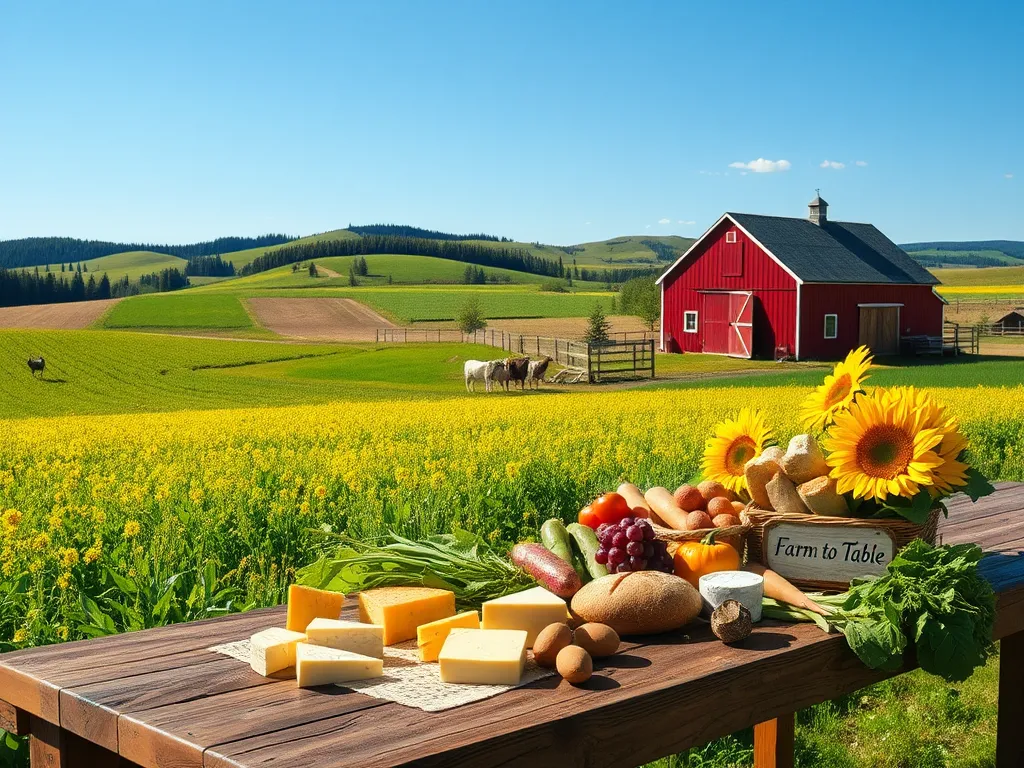Discover Sustainable Dining in Alberta: Farm-to-Table Guide

Sustainable Dining in Alberta: A Culinary Movement
Sustainable Dining in Alberta is gaining momentum, as more restaurants and consumers recognize the significance of local sourcing and environmentally friendly practices. This trend not only aims to reduce carbon footprints but also fosters a deeper connection to Alberta's rich agricultural heritage. As a province rich in biodiversity and natural resources, Alberta offers an abundance of opportunities for restaurants to create menus that celebrate local flavors and ingredients, making Sustainable Dining a crucial aspect of the dining experience.
The concept of Sustainable Dining in Alberta extends beyond just the food on the plate. It encompasses the entire food system, from farm to table. Restaurants are increasingly adopting practices such as supporting local farmers, minimizing food waste, and prioritizing seasonal ingredients. This holistic approach ensures that dining out is not just a pleasurable experience but also a responsible choice for diners who wish to support sustainability and the local economy.
One of the key components of Sustainable Dining in Alberta is the farm-to-table movement. Many restaurants are now forging direct relationships with farmers, ensuring that their produce is fresh, high-quality, and sustainably grown. This practice not only benefits diners but also has a positive impact on local farmers and the environment. By choosing to dine at these restaurants, consumers are directly supporting the sustainable agriculture movement and promoting economic resilience in their communities.
As awareness of environmental issues continues to grow, more Alberta chefs are incorporating sustainable practices into their culinary philosophy. This shift is reflected in the menus of many establishments. Chefs are dedicated to using organic and seasonal ingredients, crafting dishes that not only taste good but also contribute positively to the earth. Sustainable Dining in Alberta is, therefore, not just about eating food; it's about making conscious choices that support the planet.
In addition to farm-to-table practices, many restaurants in Alberta are exploring sustainable seafood options. With the alarming rates of overfishing and the impact of climate change on marine ecosystems, responsible sourcing has become a priority for both chefs and diners. Sustainability in seafood means choosing options that are fished or farmed in ways that maintain the health of the ocean, ensuring that future generations will also have access to these vital resources.
Farm-to-Table Restaurants
Some of the top farm-to-table restaurants in Alberta include Charcut Roast House in Calgary, known for its locally sourced meats and seasonal vegetables, and The Farm at Blackbird Hill near Edmonton, which emphasizes organic ingredients and a menu that changes with the seasons. These establishments highlight the commitment to sustainability and support for local producers.
Farm-to-table restaurants typically change their menus based on the seasons, ensuring that they are using the freshest ingredients available. Many also establish relationships with local farmers, allowing them to source produce right from the field to the table, thereby reducing the carbon footprint associated with transportation.
Chefs from these establishments often share insights on sustainable dining. For instance, interviews with chefs reveal their passion for sustainable practices, their favorite local farms, and seasonal ingredients they can’t live without. These stories not only highlight the innovative spirit of Alberta's culinary scene but also educate diners about the importance of supporting local producers.
Local Farming Practices
Community-supported agriculture (CSA) programs in Alberta allow consumers to buy shares from local farms, receiving fresh produce throughout the growing season. These programs help support farmers financially while also providing the community with access to fresh, seasonal products.
Organic farming techniques in Alberta focus on crop rotation, organic fertilizers, and pest management strategies that avoid synthetic chemicals. These practices not only enhance soil health but also increase biodiversity and promote a healthier ecosystem.
Local farms have a significant impact on sustainability. By reducing the distance food travels from farm to table, they help decrease greenhouse gas emissions. Moreover, supporting local agriculture strengthens the local economy and encourages a diverse agricultural landscape.
Seasonal Ingredients
In Alberta, seasonal produce varies throughout the year. During the summer months, fresh fruits and vegetables like strawberries, tomatoes, and zucchini are abundant, while fall brings root vegetables such as carrots and turnips. Winter may see an emphasis on preserved or cold storage items like potatoes and squash.
The benefits of eating seasonal foods include better taste, nutritional value, and lower environmental impacts. Seasonal produce is often fresher, more flavorful, and more affordable, as it's harvested at its peak.
Recipes featuring local ingredients can vary widely. For instance, a summer salad might include fresh heirloom tomatoes, cucumber, and basil, while a winter dish could highlight roasted root vegetables and grains sourced from Alberta farms, showcasing the diversity of local produce throughout the year.
Sustainable Seafood Options
In Alberta, restaurants can source sustainable seafood from responsible fisheries and farms. Certifications from organizations such as the Marine Stewardship Council (MSC) help guide consumers in making informed choices when selecting seafood dishes.
The impact of overfishing extends beyond individual species and affects entire marine ecosystems. Chefs and restaurants that prioritize sustainable seafood contribute to the health of oceans and waterways, ensuring the longevity of marine resources.
Diners are encouraged to consult buying guides for responsible seafood choices, looking for labels that indicate sustainability or seeking recommendations from restaurants that are committed to ethical sourcing practices.
Food Waste Reduction
Restaurants can implement various strategies for reducing food waste, including portion control, proper inventory management, and creative menu planning that utilizes leftover ingredients in new dishes.
Composting and recycling initiatives are increasingly common in Alberta dining establishments. Many restaurants have begun composting food scraps and recycling packaging, thereby minimizing their environmental footprint.
Diners can also practice zero-waste eating by bringing reusable containers for leftovers, choosing dishes with less packaging, and being mindful of portion sizes to avoid unnecessary waste.
Eco-Friendly Dining Practices
The importance of sustainable dining practices cannot be overstated. They contribute to environmental conservation, promote local economies, and foster a healthier community. Sustainable Dining in Alberta reflects a collective commitment to a better future.
Restaurants that implement green initiatives often feature eco-friendly decor, use biodegradable materials, and conserve water and energy. Establishments like The Greenhouse and The Edible Flower are perfect examples of restaurants that prioritize sustainability in their operations.
Consumer education on sustainable choices is vital for the movement to thrive. Diners can contribute to sustainability by researching restaurants, asking questions about sourcing practices, and supporting businesses that align with their values.
